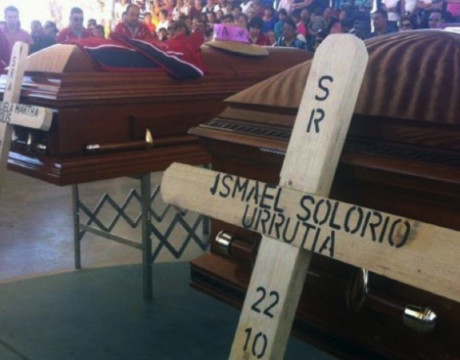 The movement for the defense of water in Mexico, led above all by farmers belonging to the organization, El Barzón, has had an initial and important victory: President Enrique Peña Nieto has just signed a decree that establishes a ban on drilling in areas of free extraction.
The movement for the defense of water in Mexico, led above all by farmers belonging to the organization, El Barzón, has had an initial and important victory: President Enrique Peña Nieto has just signed a decree that establishes a ban on drilling in areas of free extraction.
Less than a month ago, on World Water Day, the President signed an accord that provisionally suspends and prohibits the drilling of wells in so-called “free extraction zones,” in other words, those areas in which users did not need to seek permission to drill, only to inform the authorities. From now on, express, legal, sustained, and documented authorization from the National Water Commission (Conagua) is required.
Even though the decree applies to the entire nation, it came just in time to protect the northern state of Chihuahua’s aquifers. The region has been gravely affected by drought, a result of climate change. In Chihuahua, the militants of El Barzón have denounced the plundering of groundwater. It is only since 2000 that a group of wealthy Mennonite farmers have opened more than 225,000 hectares to cultivation from drilling in free extraction zones and are currently opening up 140,000 more in the desert municipalities of the state.
The barzonistas, the peasants, and responsible communities of the nation can now demand compliance with the decree with all that that implies. It will not be easy because the accord requires that Conagua regulate the vital liquid that is extracted from the aquifers each year without exceeding their available annual recharge. If it is applied as it should be, in Chihuahua alone, approximately 300,000 hectares will have to be left uncultivated immediately, that is, the surface that is not able to be irrigated with annual groundwater recharge. It seems easy, but this implies enormous opportunity costs for those who have been carrying out “extractive agriculture” so predatory in this state: to what they would lose for not planting a good part of their land, we must add the need to recover the investment in clearing and leveling lands, drilling and equipping wells, electrical installation, and irrigation systems. El Barzón’s approximate calculation notes that in these 300,000 hectares, with a minimum of 3,500 wells, the value of the investment would come to 300 million dollars in drilling and equipping wells; 325 million dollars in the acquisition and preparation of lands and 420 million dollars in the acquisition of irrigation pivots. At a minimum, the investment comes to 12, 000, 000 pesos. Therefore there will be a lot of pressure on Conagua and the federal government so that the decree will not be honored or honored only partially, in detriment to the available water for human consumption.
Therefore it is also important not only to prevent further acts of plunder of water resources, but also the impunity that encouraged the current exploitation. Those who caused the over-exploitation were not only those who drilled, since there is a long series of complicities of collusions of diverse governmental institutions: in the first place, there’s Conagua, who did not carry out the task of monitoring and supervision, but also the Secretary of Environment and Natural Resources, who allowed the change in land use of hundreds of thousands of hectares open to cultivation; the Federal Attorney Generalship of Environmental Protection, who did not ensure that the change operated according to law; the Federal Electricity Commission, who carried out electrical infrastructure works for the laying of lines, substations and wells; the Ministry of Agriculture who provided all kinds of subsidies to those who cultivated the land with increasingly scarce water; and the federal credit agencies that financed the cultivations. Many agencies and many officials will be exposed if the decree is taken seriously by the authorities who issued it.
This struggle in defense of water converges in its orientation with the broad coalition that citizen initiative has presented for the General Law of Water. Again and again, they show us that with advances like this one, social, daily, horizontal, networked, and decentralized struggles can have short and medium term success without coming to power. From the conflicts over “communal” resources like water, land and natural resources the still strong spaces of authoritarianism and injustice can be enclosed and above all, you can start generating a new culture of sustainability, of responsibility, of solidarity. For this reason, we must assess these victories and ensure that they don’t slip through our fingers.
With this initial victory we begin to honor the memory of the barzonista leaders Ismael Solorio and his wife Manuelita Solís, murdered last October for defending their community’s water.
Víctor M. Quintana is an adviser to the Democratic Peasant Front of Chihuahua, researcher/professor at the Autonomous University of Ciudad Juárez, and collaborator with the Americas Program.
Translation: Marlene Medrano



